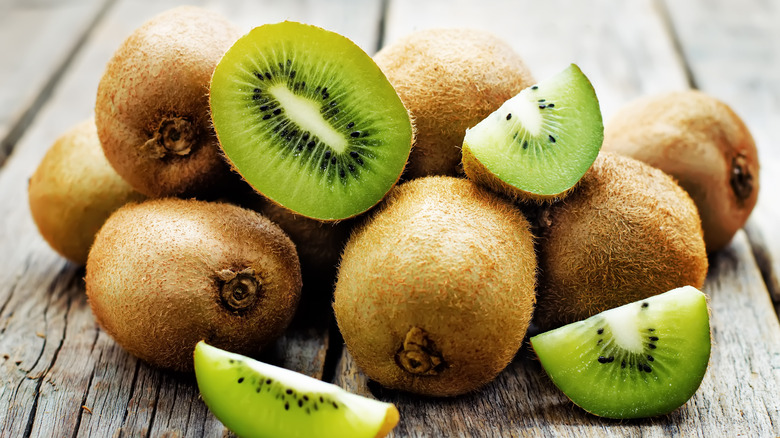A Deep Study Kiwi Growing: Introducing the Methods, Obstacles, and Potential for Lasting Farming
In this article, we will certainly take you on a deep dive right into the methods, challenges, and possibility for sustainable farming in the globe of kiwis. Discover the ideal growing problems, innovative cultivation strategies, and the lasting techniques that can unlock the complete capacity of kiwi farming.
Optimal Expanding Conditions for Kiwi Plant Kingdoms

Cutting-Edge Farming Strategies
To enhance kiwi growing, employ cutting-edge techniques that boost performance and sustainability. One such method is precision farming, which uses advanced technologies like drones, GPS, and remote picking up to check and handle crops extra effectively. Drones geared up with multispectral cameras can record high-resolution pictures of kiwi plants, enabling farmers to analyze their health and wellness and spot any indications of disease or stress and anxiety. GPS modern technology permits accurate mapping and tracking of the kiwi creeping plants, enhancing irrigation and fertilizing techniques to guarantee that each plant obtains the essential nutrients and water. An additional advanced strategy is vertical farming, which entails growing kiwi plants in stacked layers making use of synthetic lights and climate-controlled atmospheres. This approach makes best use of land use performance and decreases water usage, making it excellent for urban locations or areas with restricted cultivatable land. Additionally, aeroponics and hydroponics systems are getting appeal in kiwi farming. These soilless cultivation techniques give plants with a nutrient-rich solution or mist, specifically, promoting faster growth and higher yields. By welcoming these innovative strategies, kiwi farmers can achieve greater performance, optimize resource application, and contribute to lasting farming techniques.
Obstacles Encountered by Kiwi Farmers
Dealing with various challenges, kiwi farmers need to navigate with various challenges to ensure effective cultivation and lasting farming practices. Kiwi plants call for a particular environment to thrive, with trendy wintertimes and warm summertimes.
An additional substantial obstacle for kiwi farmers is insects and conditions. Kiwi creeping plants are at risk to a variety of bugs, including termites, aphids, and thrips, which can damage the leaves and fruit. Furthermore, conditions like Psa (Pseudomonas syringae pv. actinidiae) and botrytis can significantly influence kiwi production. Farmers must utilize incorporated parasite management practices, such as routine tracking, organic control approaches, and proper hygiene, to prevent and manage bug and condition episodes.
Kiwi growing requires labor-intensive tasks, such as harvesting, trellising, and trimming. Discovering proficient laborers that are well-informed about kiwi farming strategies can be difficult.
Lasting Farming Practices for Kiwi Growing

To guarantee lasting kiwi cultivation, you can execute an why not try this out array of practices that promote ecological stewardship and lasting practicality of your ranch. Kiwi plants call for a substantial amount of water, but excessive irrigation can lead to water waste and dirt disintegration. Adopting sustainable energy methods, such as using solar power or investing in energy-efficient technologies, can reduce your ranch's carbon impact and add to an extra sustainable kiwi cultivation system.
Unlocking the Prospective of Kiwi Farming
By carrying out lasting farming practices, you can unlock the full capacity of kiwi farming while lessening ecological influence. Kiwi farming has tremendous possibility for development and productivity, yet it also includes its own set of difficulties. To completely unlock this potential, it is important to embrace lasting methods that not just optimize return and high quality however likewise guarantee long-term viability.
One key aspect of opening the possibility of kiwi farming is maximizing irrigation techniques - what do kiwis taste like. Kiwi plants call for a certain amount of water to flourish, and by utilizing reliable watering systems such as drip you can look here irrigation or precision sprinklers, you can lessen water waste and decrease the risk of waterlogging or dirt disintegration
One more important aspect is soil health monitoring. Healthy and balanced and productive soil is essential for the development and advancement of kiwi plants. By executing techniques such as cover chopping, crop turning, and organic fertilization, you can boost soil framework, improve nutrient schedule, and reduce the need for chemical inputs.
In addition, integrated insect management (IPM) techniques are vital in unlocking the potential of kiwi farming. By taking on IPM methods such as organic insect control, scent catches, and plant tracking, you can properly handle bugs and conditions while reducing making use of chemical pesticides.
Verdict
In verdict, kiwi cultivation holds excellent possible for lasting farming practices. With ideal expanding problems and an emphasis on lasting techniques, kiwi farming can thrive while reducing ecological effect.
Discover the optimum expanding problems, cutting-edge cultivation methods, and the sustainable methods that can open the complete capacity of kiwi farming. By accepting these innovative strategies, kiwi farmers can attain greater productivity, optimize resource utilization, and contribute her comment is here to sustainable farming practices.
Facing numerous challenges, kiwi farmers must navigate through various obstacles to ensure effective farming and lasting farming techniques.By carrying out lasting farming methods, you can unlock the full potential of kiwi farming while minimizing ecological influence.In final thought, kiwi growing holds terrific prospective for sustainable farming techniques.